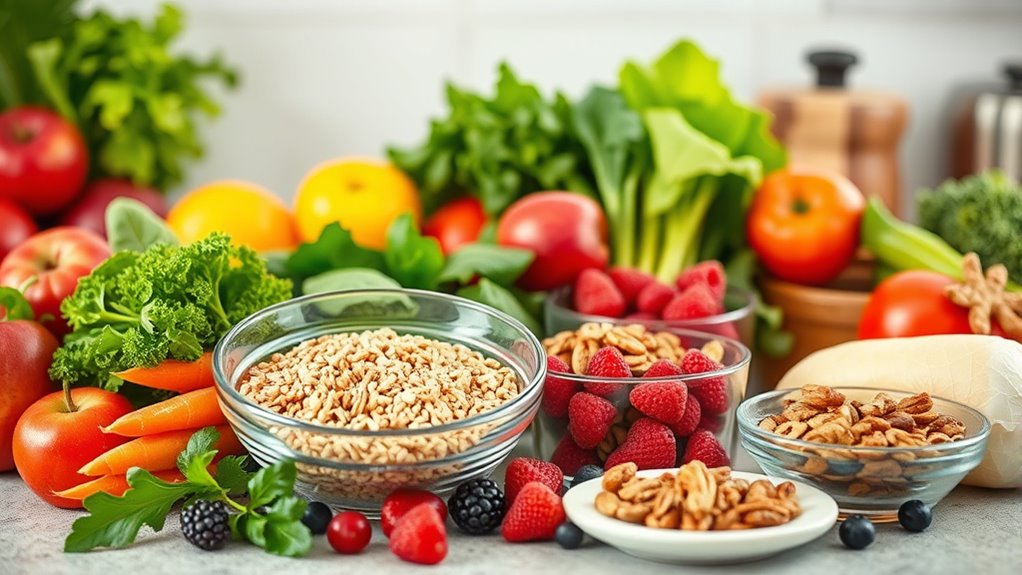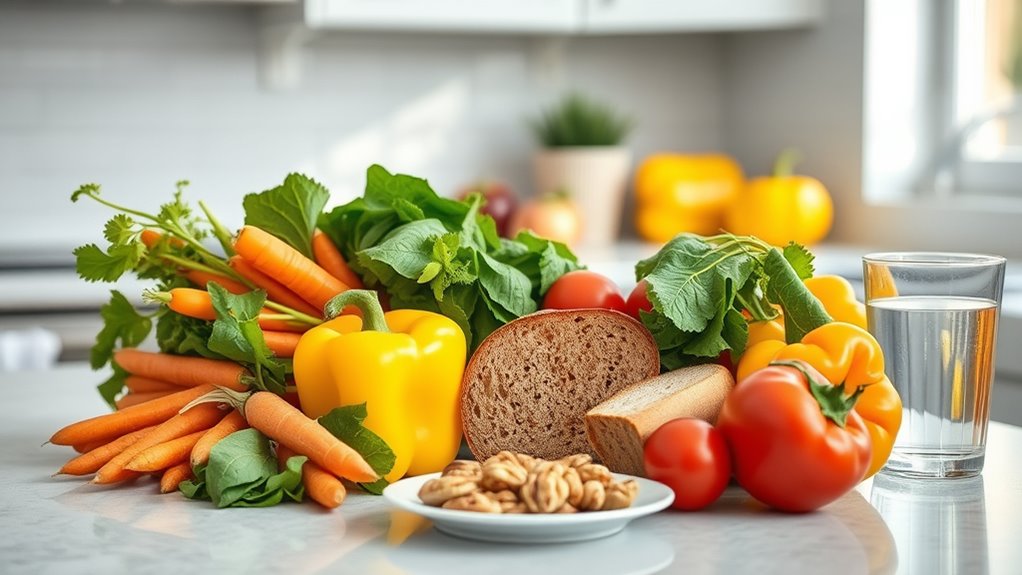To keep your child’s nutrition simple and stress-free, focus on offering a variety of foods from all food groups, like fruits, vegetables, lean proteins, and whole grains. Keep meals balanced and involve your kids in choosing foods to encourage good habits. Stay hydrated by making water appealing with natural flavors and set manageable routines. Small, consistent steps can create lasting habits, and if you continue exploring, you’ll discover even more easy ways to support your child’s growth.
Key Takeaways
- Focus on offering a variety of foods from all food groups to ensure balanced nutrition.
- Incorporate colorful vegetables and fruits to boost nutrient intake and meal appeal.
- Prioritize hydration by encouraging water consumption and limiting sugary drinks.
- Involve children in meal planning and food choices to promote healthy eating habits.
- Keep routines simple and consistent, combining meal planning with hydration habits for sustainable health.

Understanding nutrition is essential for helping your child grow healthy and strong. As a parent, you want to give your child the best start in life, and that begins with making smart food choices. One of the simplest ways to do this is through effective meal planning. When you plan meals ahead, you can guarantee your child’s diet includes a variety of nutrients they need for proper development. Focus on incorporating fruits, vegetables, lean proteins, whole grains, and dairy into their daily routine. You don’t have to be perfect—just aim for balance and variety. Meal planning also helps you avoid last-minute unhealthy choices and reduces stress during busy weekdays. Keep a weekly menu, and involve your child in selecting healthy options; this makes them more likely to try new foods and develop good eating habits early on. Including a variety of colorful vegetables can also make meals more appealing and nutritious. Additionally, learning about nutritional guidelines can help you make informed choices that support your child’s growth.
Hydration tips are equally important as food choices. Staying properly hydrated influences your child’s energy levels, focus, and overall health. Encourage drinking water throughout the day, especially during active periods or when the weather is warm. Limit sugary beverages like sodas and fruit drinks, which can contribute to weight gain and dental issues. You might find it helpful to carry a reusable water bottle with your child’s name on it or set regular reminders to take sips. Offering water first before juices or flavored drinks helps establish healthy hydration habits from the start. Remember, children often forget to drink enough, so make hydration a routine part of their day—before, during, and after physical activity. Proper hydration can also support nutrient absorption and overall growth. Drinking enough water can also help prevent dehydration-related headaches and fatigue, keeping your child energized and focused.
Another hydration tip is to make water more appealing. Add slices of fruit like lemon, lime, or berries to enhance flavor naturally. This can make drinking water more enticing and enjoyable. Additionally, hydration plays a role in your child’s digestion and nutrient absorption, which are vital for growth. Pay attention to signs of dehydration, such as dry mouth, fatigue, or dark-colored urine, especially during hot days or after vigorous activity. By establishing good hydration habits early, you help your child maintain excellent health and support their growth and energy levels. Combining proper meal planning with hydration tips creates a solid foundation for your child’s nutrition. It’s about creating simple, sustainable routines that fit into your busy life without feeling overwhelming. Remember, small consistent steps make a big difference over time. You’re guiding your child toward healthy habits that can last a lifetime, and that’s a wonderful gift. Incorporating cold-pressed vegetable juices into their diet can be an excellent way to boost nutrient intake naturally.
Frequently Asked Questions
How Can I Ensure My Child Gets Enough Vitamins Daily?
To make certain your child gets enough vitamins daily, focus on balanced diet planning with plenty of fruits, vegetables, whole grains, and lean proteins. Incorporate a variety of colorful foods to cover essential nutrients. If you’re concerned about gaps, consider vitamin supplementation after consulting with a healthcare provider. Consistently offering diverse, nutrient-rich meals helps support your child’s growth and immune health without reliance solely on supplements.
What Are Healthy Snack Options for Picky Eaters?
You want healthy snack options for picky eaters, so try offering healthy alternatives like sliced fruit, veggie sticks, or cheese. Make snacks fun by presenting them creatively—think colorful platters or fun shapes. Keep trying different options without pressure, and involve your child in choosing or preparing snacks. This way, they stay interested, and you provide nutritious choices that support their growth and development.
How Do I Handle Food Allergies in My Child?
When managing your child’s food allergies, start with professional food allergy testing to identify specific allergens. Then, focus on allergen avoidance by reading labels carefully and preparing safe meals. Educate yourself about hidden ingredients and cross-contamination risks. Keep emergency plans ready, like carrying antihistamines or epinephrine. Staying vigilant and informed helps protect your child and reduces anxiety, ensuring they enjoy meals safely without feeling left out.
When Should I Introduce Solid Foods to My Baby?
Imagine your baby’s first adventure into solids! Most experts recommend starting around 6 months, but watch for signs like good head control and interest in food. Begin with smooth baby foods, then gradually introduce different textures as they grow. These feeding milestones help your little one develop chewing skills and taste preferences. Patience is key—every baby progresses at their own pace, so trust your instincts and enjoy this exciting journey.
Are Organic Foods Really Better for My Child’s Health?
Organic foods can be better for your child’s health because they often have fewer pesticide concerns and are certified organic, ensuring fewer synthetic additives. While they might cost more, choosing organic can reduce your child’s exposure to pesticides and chemicals. Look for organic certification labels to confirm quality. Ultimately, offering a variety of whole, minimally processed foods—whether organic or not—supports healthy growth and development.
Conclusion
Now that you’ve got these nutrition basics down, you’re more than equipped to nurture your child’s health. Remember, your choices can make a monumental difference—your influence is like a superhero power in shaping their future. Don’t let nutrition feel overwhelming; instead, see it as a simple, powerful way to give your little one the best start in life. With these tips, you’re unstoppable in guiding your family toward healthy, happy habits that last a lifetime.










